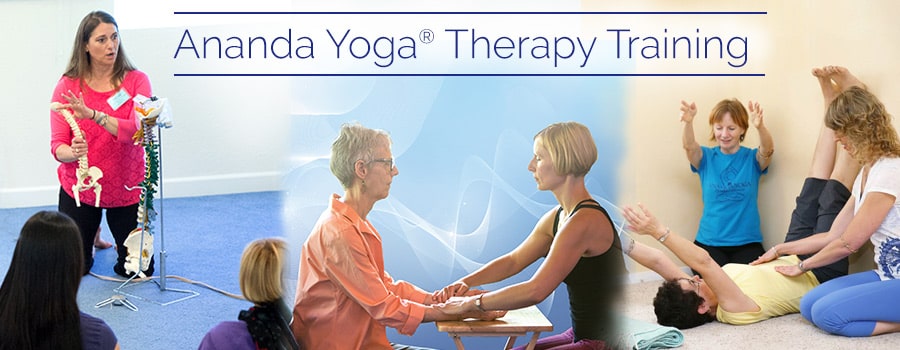SYLLABUS
Ananda Yoga® Therapy Training: Seniors & Bone Strength
We are not currently accepting new students in the Ananda Yoga Therapy Training
Course Hours: Total = 32 (Residential and Distance)
- Residential = 22
- Distance = 10 (as Home Practicum)
- Practicum = 10 (Distance, as Home Practicum)
Prerequisite
Graduate of Ananda Yoga® Teacher Training (200-hour), or
Graduate of a Yoga Alliance approved 200-hour Yoga Teacher Training
Teaching Format
This is a 3–day course which includes a combination of lecture, discussion, and case studies (with students working together in teams), and an opportunity for small groups of students to provide components of a sample yoga therapy session for clients. There is also a Home Practicum Assignment.
Faculty
Maitri Jones, BSN, RN, E-RYT-500, Ananda Yoga Therapist, C-IAYT
Barbara Bingham, BS, RPT, CYT, Ananda Yoga Therapist
Mangala Loper-Powers RN, MN, NP, E-RYT-500, Ananda Yoga Therapist, C-IAYT
Required Texts/Reading Assignments
- Ananda Yoga Therapy for Seniors and Bone Strength Manual. The Expanding Light, 2018.—Read the whole Manual.
Recommended Resources
- Fishman, Loren, and Ellen Saltonstall. Yoga for Osteoporosis: The Complete Guide. New York: W. W. Norton &, 2010.
- Meeks, Sara. Walk Tall!: An Exercise Program for the Prevention & Treatment of Back Pain, Osteoporosis and the Postural Changes of Aging. Gainesville, FL: Triad Pub., 2010.
- Additional recommended resources are included in the Course Manual.
Course Description
This course gives an overview of the physiological and psychological changes that commonly occur in seniors (65 years and older), and how the yoga therapist can help clients to optimize function and emphasize the positive aspects of gracefully moving into this stage of life.
Since more and more people over age 50 are being diagnosed with osteoporosis or osteopenia, these conditions are also addressed in this course.
Students learn cautions that need to be observed for seniors and for those who are at risk for or who have low bone density, so that they can practice yoga safely, with a special emphasis on posture, yoga asanas, pranayama and general lifestyle factors. Students will also learn and practice a variety of yoga interventions that therapeutically address the need for increased bone density for all who may be at risk for this condition, regardless of their age.
This course covers how to help older people:
- Practice yoga postures and pranayama safely
- Use yoga asana practice to optimize bone strength
- Maintain muscle strength, flexibility, and balance
- Embrace a positive attitude about aging
Learning Objectives
At the completion of the course, students will:
- Gain in depth knowledge about the normal aging process including both physiological and psychological changes, as they relate to addressing these needs in their yoga therapy practice.
- Gain knowledge of Osteoarthritis and the implications for safe practice of yoga postures and daily life activities.
- Develop knowledge about recent research related to aging and the brain, and apply this knowledge to assist seniors to maximize their brain health.
- Develop an appreciation for and apply therapies to encourage a dynamic approach to Inspired Aging.
- Explain how a mature brain has an advantage over a younger brain.
- Describe environmental considerations in setting up spaces for the practice of yoga postures for seniors.
- Gain knowledge about Osteoporosis and Osteopenia, Fracture Risk considerations, and Bone Density measurement tests; and be able to apply this knowledge in guiding clients who have or are at risk for low bone density in safe yoga practice and activities of daily living.
- List the major cautions for those with low bone density in the practice of yoga postures.
- Explain how posture impacts the density of bones.
- Demonstrate the ability to teach yoga postures gently and safely to help seniors and those with low bone density to maintain full and active lives.
- Demonstrate how to help people, even as they age, to build strength, flexibility and balance.
- Demonstrate the ability to enhance bone density for the otherwise healthy yoga practitioner and for those with low bone density.
- Gain in depth knowledge and demonstrate the ability to modify asanas for those with osteopenia and osteoporosis, including those who already experience postural and structural changes.
- Demonstrate the ability to choose appropriate pranayama techniques with modifications for seniors.
- Create a therapeutic yoga routine for an otherwise healthy student with osteopenia and another for the same kind of client with osteoporosis.
- Create a therapeutic yoga routine for a frail senior with osteoporosis.
Subject Matter/IAYT Competencies Covered:
Section 1. Yoga Foundations
Category 1.1. Yoga Teachings and Philosophy
1.1.1. Familiarity with the evolution of the teachings and philosophy of the yoga tradition and its relevance and application to yoga therapy, including teachingsfrom Vedic and post-Vedic periods, Samkhya,Yoga,Tantra, and Ayurveda.
Category 1.2. Yoga and the Mind
1.2.2. Knowledge of yoga perspectives on distracted/disturbed conditions of mind and their expressions as expressed in such texts as the Yoga Sutras, the Bhagavad Gita, and other texts, including but not limited to,
Category 1.3. Framework for Health and Diseasee
1.3.1. Knowledge of the basic perspectives on health and disease from yoga and Ayurveda relevant to the practice of yoga therapy.
1.3.2. Knowledge of categorizing illness.
1.3.2.1. Development/evolution of disease (samprapti [pathogenisis]), including but not limited to direction, intensity, onset, and duration and their influence on the ease or difficulty of healing and disease management.
1.3.2.2. Setting priorities: symptoms/pacification (shamana [short term]) and purification/strengthening (shodhana [long term]).
Section 2. Biomedical and Psychological Foundations
Category 2.1. Anatomy and Physiology
2.1.1. Knowledge of human anatomy and physiology, including all major systems of the body and their interrelationships, as relevant to the work of a yoga therapist.
2.1.2. Knowledge of biomechanics and movement as they relate to the practice of yoga and the work of a yoga therapist.
2.1.3. Knowledge of common pathologies and disorders of all the major systems, including symptoms, management, illness trajectories, and contraindications, as relevant to the work of a yoga therapist.
Category 2.2. Additional Biomedical Knowledge
2.2.1. Familiarity with commonly used drugs and surgical procedures, as relevant to the work of a yoga therapist.
2.2.2. Familiarity with common medical terminology.
2.2.3. Knowledge of how to reference current healthcare information relevant to the work of a yoga therapist, including pathologies, disorders, drugs, and surgical procedures, as relevant to the work of a yoga therapist.
Category 2.3. Psychology and Mental Health
2.3.1. Basic knowledge of commonly occurring mental health conditions— from psychological distress to psychiatric conditions—their symptoms, and common approaches/interventions, as they relate to the work of a yoga therapist.
2.3.2. Basic knowledge of psychological concepts and terminology, including mood, cognition, behavior, and personality, as relevant to the work of a yoga therapist.
Category 2.4. Additional Knowledge
2.4.1. Familiarity with models of human development, including developmental stages, lifecycles, and personality, and their importance to medical and psychological health and well-being.
Category 2.5. Body and Mind Integration
2.5.1. Knowledge of the interaction of the body, breath, mind, intellect, and emotions in health and well-being.
Section 3. Yoga Therapy Tools and Therapeutic Skills
Category 3.1. Yoga Therapy Tools
3.1.1. In-depth knowledge of the application of yama and niyama in the context of yoga therapy.
3.1.2.1. Asana (postures);
3.1.2.2 Pranayama (regulated breathing);
3.1.2.3. Meditation and relaxation techniques such as bhavana (visualization), mantra (recitation), and ritualized activities such as nyasa and mudra.
3.1.3. In-depth knowledge of contraindications of yoga practices for specific conditions and circumstances.
Category 3.2 Basic Principles of the Therapeutic Relationship
3.2.1. In-depth knowledge of, and observed capacity for, well-developed communication skills: listening, presence, directive and non-directive dialogue.
3.2.2. Demonstrated ability to recognize, adjust, and adapt to specific client/student needs in the evolving therapeutic/professional relationship
3.2.3. Demonstrated ability to recognize and manage the subtle dynamics inherent in the therapist/client relationship.
Category 3.3 Principles and Skills for Educating Clients/Students
3.3.1. In-depth knowledge of and demonstrated ability to implement effective teaching methods, adapt to unique styles of learning, provide supportive and effective feedback, acknowledge the client's/student's progress, and cope with unique difficulties/successes.
3.3.2. In-depth knowledge of and demonstrated ability to transmit the value of self-awareness and self- responsibility throughout the therapeutic process.
3.3.3. In-depth knowledge of and demonstrated ability to develop and adjust appropriate practice strategies to the client/student.
Category 3.4 Principles and Skills for Working with Groups
3.4.1. Basic knowledge of and demonstrated ability to design, implement, and evaluate group programs.
3.4.2. Familiarity with group dynamics and techniques, including communication skills, time management, and the establishment of priorities and boundaries, as well as techniques to address the specific needs of individual participants, to the degree possible in a group setting.
Section 4. Practicum
Category 4.1 Providing Yoga Therapy
4.1.1. Demonstrated ability to conduct intake and assess the client/student, including
4.1.1.1. Taking a history of the client and his/her condition(s); and
4.1.1.2. Assessing the current condition using the tools relevant to the yoga therapist, including an evaluation of the physical, energetic, mental, emotional, and spiritual dimensions of well-being.
4.1.2. Demonstrated ability to elicit the goals, expectations, and aspirations of the client/student.
4.1.3. Demonstrated ability to integrate information from the intake, evaluation, and observation to develop a working assessment of the client's condition, limitations, and possibilities.
4.1.4. Demonstrated ability to apply knowledge of how to determine which aspects of the client/student's conditions, goals, and aspirations might be addressed through yoga therapy.
4.1.5. Demonstrated ability to identify priorities and set both long- and short-term goals with the client/student.
4.1.6. Demonstrated ability to apply knowledge of pacification, purification, and strengthening strategies.
4.1.7. Demonstrated ability to apply knowledge of strategies that address common disorders and pathologies of the major human systems and common mental health conditions, as well as other goals and aspirations of the student as relevant to the work of a yoga therapist.
4.1.8. Demonstrated ability to apply knowledge of how to combine intake, evaluation, observations, and working assessment to develop an appropriate practice or session strategy for individual clients/students as well as group classes, taking into consideration the holistic nature of the individual.
4.1.9. Demonstrated knowledge of how to choose and prioritize the use of yoga tools and techniques, including selecting, sequencing, adapting, and modifying yoga practices appropriate to the needs of clients.
4.1.10. Demonstrated ability to teach or deliver the appropriate practices for individuals as well as groups, taking into consideration the assessment of their conditions, limitations, possibilities, and the overall practice strategy.
4.1.11. Demonstrated ability to facilitate the client/student's experience of the practice.
4.1.12. Demonstrated ability to develop and maintain therapeutic relationships.
4.1.13. Demonstrated ability to provide follow up and re-planning.
Section 5. Professional Practice
Category 5.1. Ethical Principles
5.1.1. In-depth knowledge of yoga practices and methods for self-inquiry related to establishing, practicing, and maintaining ethical principles.
5.1.2. In-depth knowledge of generally accepted ethical principles of health care codes of conduct and yoga's ethical principles.
5.1.3. Demonstrated ability to apply knowledge of generally accepted ethical principles and related concepts from the yoga tradition to professional interactions and relationships.
5.1.4. In-depth knowledge of the scope of practice of yoga therapy, resulting in the demonstrated ability to discern the need for referral to other modalities.
5.1.5. Knowledge of the extent of one's own individual training, skills, and evolving experience in yoga therapy, and knowledge of the importance of practicing within such parameters.
Category 5.3. Relationships with Peers, Mentors, Clinicians, and Organizations
5.3.1. Basic knowledge of other healthcare fields and their potential role in and relevance to the work of a yoga therapist.
Course Completion Requirements
- Attendance at all classes.
- Completion of all assigned readings.
- Participation in class discussions and activities (including case studies, review sessions, practicums). Participation needs to reflect that the student has learned and begun to assimilate the information from their assigned readings. (The faculty will be assessing whether the student has achieved the level of knowledge and appropriate application of that knowledge according to the IAYT Competencies that apply.)
- Satisfactory performance on in-class (closed-book) Quizzes (80%). This will indicate an achievement of the stated course Learning Objectives. Students will be given Answer Keys to the Quizzes immediately after taking them, and there will then be time for further Q & A and group discussion with faculty.
- During in-class practicums, students must provide yoga therapy interventions in a safe and appropriate manner, in accordance with the IAYT Competencies for providing yoga therapy (Section 4, Category 4.1), as determined by supervising faculty. Students are given immediate feedback from faculty and peers on all aspects of their observational, assessment, decision-making, planning, teaching and record-keeping skills.
- Satisfactory completion of the Home Practice Assignment. Students are given written feedback by supervising faculty, along with an offer to speak in person or by phone in addition. If the expected standard of satisfactory performance (set by IAYT Standards and Competencies) is not met, then students will be given additional guidance and assignments as needed until they can demonstrate the expected competency.
- If any of the above requirements or expectations are not met, the student will be counseled and/or given additional assignments in order to help them be able to demonstrate satisfactory performance.
Ananda Yoga Therapy Training
- Overview
- Flow Chart of Ananda Yoga® Therapy Training Courses
- Course Syllabi
- Tuition Costs
- Ananda Yoga® Therapy Training Courses Scheduled
- Frequent Questions
- Instructors
- Apply for Level 1
- Student Handbook with Costs
- Bridge to Ananda Yoga
Upcoming Courses in date order
- Restorative Ananda Yoga® Teacher Training - In Person
- Ananda Yoga® Advanced Training: Therapeutic Yoga for Seniors and Bone Strength
- Ananda Yoga® Assistantship
- Bhagavad Gita Retreat
- The Essence of the Yoga Sutras According to Paramhansa Yogananda
- Ananda Meditation® Teacher Training - In Person
- Advanced Pranayama
- Ananda Yoga® Therapy Training: Principles
- Ananda Yoga® Therapy Training: Musculoskeletal–1
- Ananda Yoga® Therapy Training Online: Ayurveda
- Ananda Yoga® Therapy Training Online: Health Challenges–1
- Ananda Meditation® Solutions
- Ananda Spiritual Counseling® Training - In Person
- Ananda Yoga® Therapy Training: Musculoskeletal–2
- Ananda Yoga® Therapy Training Online: Health Challenges–2
- Ananda Yoga® Therapy Training: Psychology and Mental Health
- Ananda Yoga® Therapy Training: Holistic Health Therapist Training
Nursing CEU Eligible: details coming

How to Choose a
Yoga Teacher Training Program
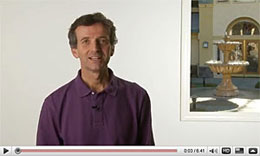
“My 4 weeks of Ananda Yoga Teacher Training was one of the most fulfilling and spiritually transforming periods in my life. All of the faculty, along with the entire Ananda community, were very supportive and nurturing.” – R. F., Lake Bluff, IL.

Testimonial for the Ananda Yoga Therapy Training Program
“The program is all embracing ˜ asana, ayurveda, chakras, special health issues touching on body, mind, and spirit. The instructors were wonderful, knowledgeable, supportive, and enthusiastic.” – T.C., CA.
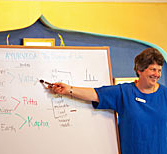
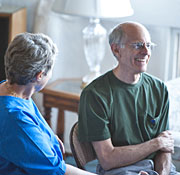
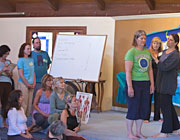

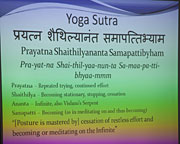
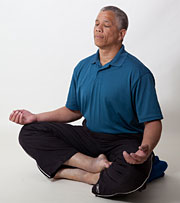
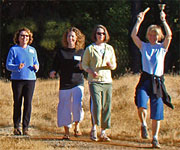
The yoga therapy components of these courses are based on our accreditation by IAYT, not derived from our status as an RYS with Yoga Alliance Registry.
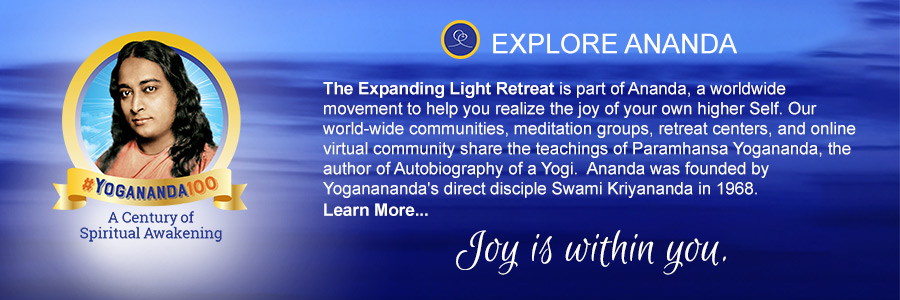

CONNECT
14618 Tyler Foote Rd
Nevada City, California 95959
Toll free 800-346-5350
Outside US 530-478-7518
LEARN MORE
SUBSCRIBE
Receive uplifting emails with inspirational content and news about our retreat programs, travels, and trainings.



